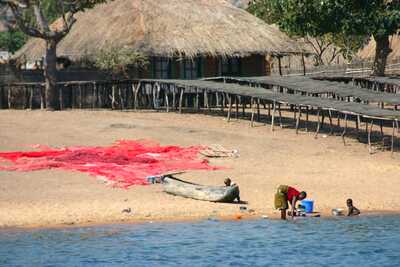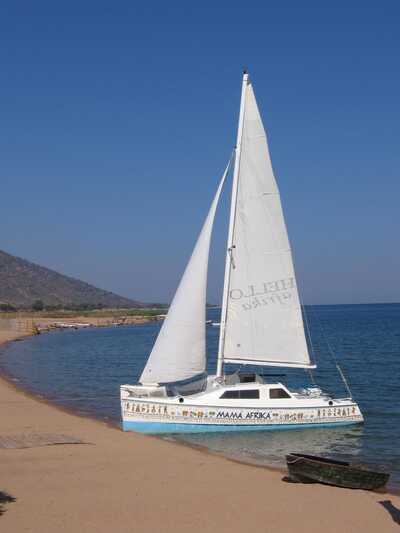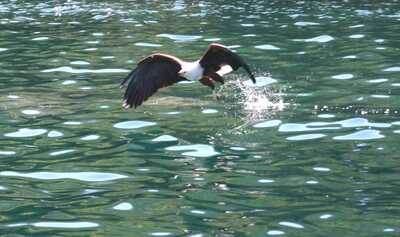


After blasting up the road for a couple of hours we arrived in Monkey Bay. I had heard and read a lot about this village/town but wasn’t impressed: it just seemed to be a straggle of a village with a dusty road and a few shops - perhaps we should have explored more for its hidden depths. Instead we pressed on for Cape St Claire where the guidebook had highlighted what appeared to be particularly good accommodation on the lakeshore. As we approached the Lake we were twice flagged down by lads welcoming us to the area and then giving us the hard sell - they really wanted us to hire them and their boats to go out onto the Lake. One gave us directions to our destination, the next said it had closed down - which to believe! On our wanderings we came across the Dufour Lodge - it was an up-market establishment that was based around a very nice sailing catamaran: myth has it that it cost more to transport it to the Lake than its original purchase price. Perhaps that’s why their rates were so high. The ex-pat owner, who greeted us on his closely cropped green lawn leading down to the beach, confirmed that our destination was indeed closed. He suggested the Chemba Eagle’s Nest Lodge. This was on the very edge of the lake right at the end of the beach with the end of the village one side and big boulders at the foot of a hill on the other. Spread along beach were half a dozen little tent-like chalets with views out to the Lake - unfortunately, they still hadn’t linked up the toilet etc: but still intended to make a hefty charge. So we opted to camp.

The site sloped gently down to the beach and was bounded on the South side by a steep hillside and to the North by a mound of big boulders which were inhabited by many Water Monitors which came out each morning to sun themselves. We set up camp quite close to the beach under the shade of a small tree and sat, snacked & watched the lake for a while. When I became bored with the lapping waves, I went off to explore and found all the staff watching football on the TV - Malawi v Namibia: the latter was by far the better team and won. Suddenly we realised that the day had flown doing nothing and the sun was about to set across the Lake. As it sank, it generated a gradual progression through the colours of the rainbow, occasionally silhouetting fishing boats as they set off from the adjoining village for a night on the Lake. The next morning we had booked a half-day cruise on the Lodge's sailing catamaran "Moma Africa" - the options had been a morning, an afternoon, all-day or just a sunset cruise. Pat hadn't fancied an all day trip and we thought that it might be too hot in the afternoon and that the sunset one was too short. Pushing off from the beach, we headed off trying to pick up a puff of the light breeze as we crossed the bay towards an island where we were to snorkel. On the way we went past a number of fishing villages where people were doing their washing on the beach and there were long silver racks of drying fish.

After an hour or so, we slipped into a small cove on an island with the trees coming straight down the slope into the water with only as few rocks on the water line. So, on with the snorkel & flippers and into the cooling water. Once away from the yacht and into the shallows under the shade of the trees, there were massed of coloured Cycliad fish darting singly and in small schools through the crystal clear water. They ranged from almost transparent to bright blues. Pat wasn’t a strong swimmer and tried her luck whilst wearing a life jacket - not the most practical piece of equipment if you wish to breach the surface - but she professed to be happy. When we became bored with this, we upped anchor and motored around to the other side of the island where we tried to tempt Fish Eagles with dead fish. After a while, and after a false alarm with a Kite who didn’t know he wasn’t an Eagle, our skipper succeeded in having 2/3 Eagles stooping on our bait from all angles.
We puttered back to the campsite for lunch and then a drive through the
village to a craft stall Pat had seen on the previous day. After asking for
directions several times as the guide book seemed to be slightly misleading,
we headed up a dirt road into the hills. The catholic mission where the craft
school was based was massive there was a massive church, a hospital and what
looked like the remains of a ‘pleasure garden’ and zoo. However,
 the actual range of crafts on sale was disappointing and we left without
making a purchase. When we reached Salima again we stopped for lunch in a
little restaurant attached to the service station and watched the town’s
life from a shady table. Instead of motorised taxi, there seemed to be quite a
few pushbikes with a padded shelf over the back wheel that provided an
alternate form of conveyance.
the actual range of crafts on sale was disappointing and we left without
making a purchase. When we reached Salima again we stopped for lunch in a
little restaurant attached to the service station and watched the town’s
life from a shady table. Instead of motorised taxi, there seemed to be quite a
few pushbikes with a padded shelf over the back wheel that provided an
alternate form of conveyance.
When we reached Lilongwe and Kiboko, our resting-place for the night, we found it absolutely heaving with an overland truck and three Brit school parties. As a result all the accommodation was taken and they were even turning away people who wanted to camp - it was lucky I had booked our places when I left a week ago. I tied up the Disco before we both headed off to town - Pat to hit the craft market, still hunting for a carved wooden chair and me to try my luck at an internet cafe. She didn't find a suitable chair and I didn't get through to my e'mail accounts, so we both headed off to find a pharmacist to buy anti-Scitzomasis (the little worms you can pick up from shallow water in Lake Malawi). In the UK it would be a drug that you would need a Doctor's prescription to buy but here it was freely available over the counter. We both took advantage of this freedom to buy a supply of antibiotics that were supposed to be good for upset intestines - Pat for her planned trip to Afghanistan and me for mine to India. Before heading back to the accommodation and an evening meal, I raided the bank to fill every container (the long-range tank, both jerry cans and the big water container that had been i had with fuel at cheap Malawian prices before heading back to Zambia's much higher prices.

The next morning was an early start to ensure Pat was at the airport in time and then it was off Westwards back to the border. This was a painless passage apart from me having a quick panic at the Zambian counter as I'd left my passport at the Malawian office. Then for the long trek down to Lusaka - the only excitement was a parade of very smart ladies as I passed through one town and a sudden wobble by the Disco on a straight stretch of road. When I got out to have a look around I half expected a wheel just about to come off but it turned out that the brackets on one of the rock sliders (a heavy metal replacement sill) had broken and it was swinging by two bolts. So out with the red warning triangles back & front (just in case the police happened past) and the tool kit. As a lay on the gravel undoing the bolts I soon generated an interested audience of local lads - I've no idea where they came from but that's Africa for you. Twenty minutes later the slider was tied to the roof rack and I was off again blasting South whilst listening to an audio book. Ten hours after leaving Lilongwe airport, I arrived at Pioneer Camp on the North side of Lusaka and booked myself into one of its small bungalows - four walls, a thatched roof and a bed. The barman who took my money for the room remembered me from several years ago when I passed through with Alan & Oriel on the way from South Luangua in the North East to Liuwa Plains in the West. As the sun was setting I headed into town to do my shopping for Zimbabwe in the last decent supermarket before the border. Whilst I was in the shopping centre, I took advantage of facilities to have a decent (i.e. one I hadn't cooked) meal.
| Go Back | Home | Next - Back to Livingstone |